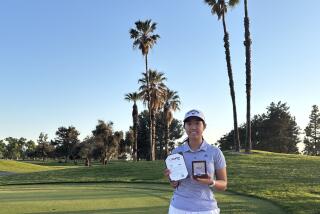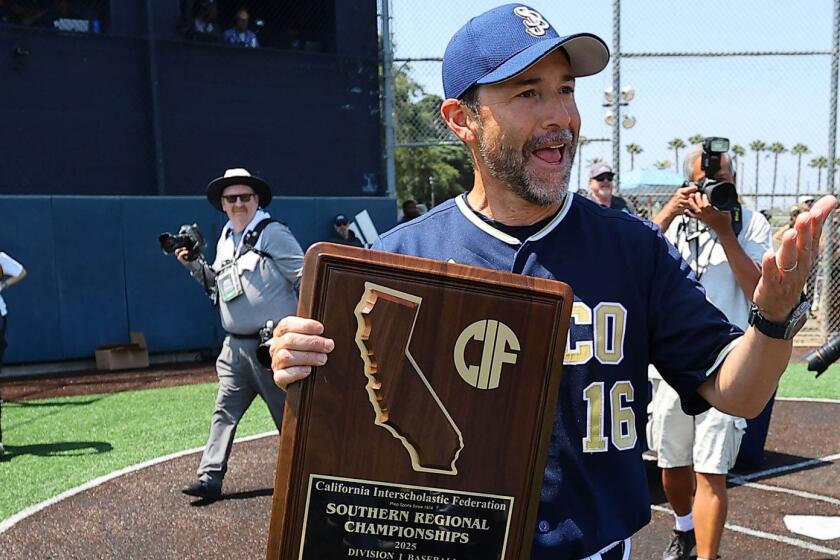Column: Augusta National ushers in new era with amateur women’s event
- Share via
Reporting from augusta, ga. — On the 15th anniversary of its war against women, the Augusta National Golf Club commemorated the event Wednesday not with mournful band or heartfelt hymn, but a single click.
For the first time, the most exclusive American sports venue unlocked its venerable Magnolia Lane gates for a competitive championship round to be played by golfers other than those in the Masters.
That round will be played by women.
In a morning announcement that could be the equivalent of this week’s most enduring Masters roar, new Augusta chairman Fred Ridley revealed the establishment of the inaugural Augusta National Women’s Amateur Championship to be played here next April.
The golf world instantly was filled with the sound of jaws hitting the floor. A club that did not even allow women members until 2012 was now going to invite them to spend a day competing on their most sacred of grounds?
It was enlightening. It was invigorating. It was also pretty stunning.
“We are always looking for new ways to benefit and impact the game,’’ Ridley said. “I wanted to do this, and I wanted to do it here.’’
The club will invite 72 of the world’s best amateurs. They will play the first two rounds at a nearby course. Those with the lowest 30 scores will advance to the finals at Augusta on the Saturday before Masters week, in a round that will be televised globally and treated exactly like the Masters.
Well, all except for the green jacket. They’ll give the winner something they hope will be equally treasured, they’re just not sure what.
“We don’t know yet, we’ve got to work on that,’’ Ridley said, smiling.
Even though women’s amateur golfers are not well known, the national affinity for the Augusta course could make that round the most watched domestic women’s sports event, with only the women’s World Cup drawing bigger ratings.
This is already perhaps the most surprising women’s sports event, considering the 85-year-old club has been known not only for picturesque beauty but also social ugliness.
There were no African Americans allowed to play in the Masters until 1975. There were no African Americans allowed to join the club until 1990. Then, precisely 15 years ago, then-chairman Hootie Johnson engaged in an infamous verbal war with feminist activist Martha Burk over her insistence that the private club admit women.
Johnson claimed they would not allow female membership ‘’at the point of a bayonet.’’ Burk fought back by encouraging Masters sponsors to end their association.
Johnson simply televised the tournament without sponsors. Burk fought back by staging a sparsely attended protest down the street from the course during the middle of Masters week.
The fight didn’t really end until eight years later, when Augusta finally admitted two women, and it will be forever noted in the life stories of both combatants. In fact, when Johnson died in July at age 86, the incident was listed high in his obituary.
Johnson was replaced by former Atlanta Olympic Committee president Billy Payne, who ushered in the first women members. Last fall, the retiring Payne was replaced by Ridley, a former U.S. Amateur champion and United States Golf Association president who is clearly an advocate for the power of the game’s inclusiveness.
“I just felt that there was an opportunity and a platform to make a statement as to how we feel about this part of the game, I just felt it was time to do that,’’ Ridley said. “I happen to have three daughters, and they all love golf.’’
He hinted that this was only the beginning of change, noting, “Golf’s a great game, hopefully it’s color blind, it’s blind as to gender. … I can assure you there will be more women members at Augusta National.’’
Thus begins a new era at the home of one of sports’ most powerful voices, and women golfers everywhere are noticing.
“No one ever thought this would happen,’’ said Haley Moore, the world’s 25th ranked amateur from Escondido. “ No one ever thought Augusta would allow women to compete there. It’s truly special and amazing.’’
Moore is a junior at University of Arizona, and women golfers often leave school early to turn pro, but she said this announcement would convince her to remain an amateur until she gets a chance to play Augusta.
“For a chance to play at this amazing place, I will wait to turn pro, and I think other top amateur women golfers will do the same,’’ she said. “A chance to learn on that stage, to walk in the footsteps of such great champions, it will be such a great learning experience, I will not turn that down.’’
It will indeed be compelling to see women playing in a golfing cathedral that, for the only four days a year it appears on television, previously showcased just men.
“Augusta is the most iconic venue in our game, all eyes are on everything they do,’’ said Nikki Gatch, a San Diego-based PGA pro and regional league manager for PGA of America. “It’s so great that women will be in that spotlight.’’
Augusta already hosts the Sunday finals of the Drive, Putt & Chip championship for junior golfers. This will only add to the club’s increasing legacy of empowerment.
“It’s huge. It’s a wonderful step,’’ Gatch said. “It’s wonderful for the game of golf in general. Over the last few years, Augusta has really become committed to growing the game.”
For years, women watched the Masters and knew they could never play there. That has changed.
“Juniors will watch this and think, in two or three years, I want to be there,’’ Moore said. “This will influence more little girls to play golf.’’
And one day, perhaps, there actually could be an entire week devoted to women, maybe an actual women’s Masters?
“After seeing this happen, why not?’’ Gatch said.
As improbable as this would have sounded before Wednesday, yes, here at Augusta National, anything now seems possible.
Get more of Bill Plaschke’s work and follow him on Twitter @BillPlaschke
More to Read
Go beyond the scoreboard
Get the latest on L.A.'s teams in the daily Sports Report newsletter.
You may occasionally receive promotional content from the Los Angeles Times.











